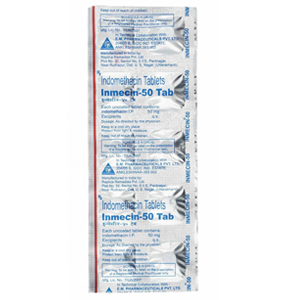
We accept Bitcoins
Get 10% discount!!!
Indomethacin (Inmecin-50)

The image may differ from the actual product
Indomethacin (Inmecin-50) known as a nonsteroidal anti-inflammatory drug is used to relieve pain, swelling, and joint stiffness caused by arthritis, gout, bursitis, and tendonitis.
WHAT INDOMETHACIN IS AND WHAT IT IS USED FOR
Indomethacin belongs to the group of medicines known as nonsteroidal anti-inflammatory drugs. It is used for:
- Degenerative hip disease
- Ankylosing spondylitis
- Rheumatoid arthritis
- To reduce swelling
- Muscular pain
- Low back pain
- Pain following bone or joint surgery
- Gout
- Period pain
WHAT YOU NEED TO KNOW BEFORE YOU TAKE INDOMETHACIN h4>
Do not take Indomethacin if you:
- Think you are pregnant, planning to get pregnant, or are breastfeeding
- Have polyps in your nose with associated symptoms like itching, rash, wheezing, or swelling
- Are allergic to Indomethacin aspirin, ibuprofen, or other NSAIDs
- Are taking other NSAIDs, including COX II inhibitors
- Have or had peptic ulcers or bleeding in your digestive tract
- Have severe liver, kidney, or heart problems
Warnings and Precautions
Talk to your doctor or pharmacist before taking Indomethacin if you:
- Have epilepsy, Parkinson’s disease, or psychiatric issues
- Suffer from high blood pressure, heart disease, or fluid retention
- Are being treated for infection or fever
- Suffer from asthma or bowel diseases such as Crohn’s disease
- Have kidney, liver disease, diabetes, or heart failure
- Have rheumatoid arthritis or blood clotting issues
- Are due for surgery
Other Considerations
If you are elderly or have previously had stomach ulcers, you are at higher risk of side effects. Do not exceed the recommended dose. Consult your doctor if you have heart problems, diabetes, high cholesterol, or are a smoker.
Indomethacin tablets must not be used in children.
OTHER MEDICINES AND INDOMETHACIN (INMECIN-50)
Inform your doctor if you are taking or have recently taken:
- Aspirin, ibuprofen, or other NSAIDs
- Corticosteroids
- Anticoagulants (e.g., warfarin)
- SSRIs (for depression)
- Quinolone antibiotics
- Lithium, haloperidol, or antiviral medicines
- Medicines for blood pressure, diabetes, or heart conditions
- Diuretics
- Muscle relaxants, immune system medicines, or methotrexate
PREGNANCY, BREAST-FEEDING AND FERTILITY
Indomethacin may affect fertility. Consult your doctor if you are pregnant, planning to conceive, or breastfeeding.
DRIVING AND USING MACHINES
Indomethacin may cause dizziness, drowsiness, fatigue, or visual disturbances. Avoid driving or operating machinery if affected.
TESTS
Your doctor may perform tests to monitor your kidney and liver function, blood cells, or stomach health, especially if you are elderly or have a history of high blood pressure, heart failure, or rheumatoid arthritis.
SURGERY
If you are about to have or have recently had surgery, consult your doctor before using this medicine.
HOW TO TAKE INDOMETHACIN
Always take this medicine as prescribed. Take with food or an antacid to avoid stomach upset. If you overdose, seek immediate medical attention. If you forget a dose, do not double up; take the next dose at the correct time.
POSSIBLE SIDE EFFECTS
Serious Side Effects
- Passing blood in stools, black tarry stools, or vomiting blood
- Severe allergic reactions (e.g., difficulty breathing, swelling)
- Severe stomach issues or skin reactions
- Aseptic meningitis symptoms (e.g., headache, fever, stiff neck)
Other Side Effects
Contact your doctor if you experience:
- Nervous system issues (e.g., dizziness, headaches, seizures)
- Stomach and intestinal problems (e.g., nausea, vomiting, ulcers)
- Vision or hearing disturbances
- Blood disorders
- Heart, liver, or kidney issues
- Skin conditions
HOW TO STORE INDOMETHACIN
- Keep out of reach of children
- Store in a cool, dry place below 30°C
- Dispose of unused medicine responsibly
Always consult your doctor or healthcare provider for more information.

 English
English 









